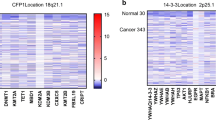Abstract
Background
CCR6 expression is deregulated in some human malignancies and may be involved in the tumor progression. The aim of the present study was to determine the CCR6 expression in gastric cancer (GC) and to clarify its clinical significance.
Methods
We used western blotting to examine CCR6 protein expression in GC tissues and matched adjacent non-tumor tissues. Immunohistochemistry was performed on a large cohort of 372 postoperative GC samples. Chi-square test, Kaplan–Meier analysis and Cox regression model were used to analyze the data.
Results
Upregulated CCR6 protein expression was observed in the GC tissues by western blotting compared with the adjacent non-cancerous gastric tissues. High CCR6 expression was detected in 56.5 % (210/372) samples and significantly associated with the extracapsular extension of the tumor, tumor relapse and poor overall survival in GC (P < 0.001). Further analysis demonstrated that the CCR6 expression level stratified the patient outcome in stage II, stage III, T3/4, N positive and poorly differentiated/undifferentiated tumor subgroups. The Cox regression analysis showed that high expression of CCR6 was an independent prognostic factor for GC patients.
Conclusions
CCR6 expression may be a novel biomarker for predicting clinical outcomes for GC patients.




Similar content being viewed by others
References
Zhang L, Tian W, Kim S, Ding W, Tong Y, Chen S. Arsenic sulfide, the main component of realgar, a traditional Chinese medicine, induces apoptosis of gastric cancer cells in vitro and in vivo. Drug Des Devel Ther. 2014;9:79–92.
Coburn NG. Lymph nodes and gastric cancer. J Surg Oncol. 2009;99:199–206.
Song KY, Park SM, Kim SN, Park CH. The role of surgery in the treatment of recurrent gastric cancer. Am J Surg. 2008;196:19–22.
Hieshima K, Imai T, Opdenakker G, Van Damme J, Kusuda J, Tei H, et al. Molecular cloning of a novel human CC chemokine liver and activation-regulated chemokine (LARC) expressed in liver. chemotactic activity for lymphocytes and gene localization on chromosome 2. J Biol Chem. 1997;272:5846–53.
Ghadjar P, Coupland SE, Na IK, Noutsias M, Letsch A, Stroux A, et al. Chemokine receptor CCR6 expression level and liver metastases in colorectal cancer. J Clin Oncol. 2006;24:1910–6.
Rubie C, Oliveira V, Kempf K, Wagner M, Tilton B, Rau B, et al. Involvement of chemokine receptor CCR6 in colorectal cancer metastasis. Tumour Biol. 2006;27:166–74.
Frick VO, Rubie C, Kölsch K, Wagner M, Ghadjar P, Graeber S, et al. CCR6/CCL20 chemokine expression profile in distinct colorectal malignancies. Scand J Immunol. 2013;78:298–305.
Schutyser E, Struyf S, Van Damme J. The CC chemokine CCL20 and its receptor CCR6. Cytokine Growth Factor Rev. 2003;14:409–26.
Kimsey TF, Campbell AS, Albo D, Wilson M, Wang TN. Co-localization of macrophage inflammatory protein-3 alpha (Mip-3 alpha) and its receptor, CCR6, promotes pancreatic cancer cell invasion. Cancer J. 2004;10:374–80.
Ghadjar P, Loddenkemper C, Coupland SE, Stroux A, Noutsias M, Thiel E, et al. Chemokine receptor CCR6 expression level and aggressiveness of prostate cancer. J Cancer Res Clin Oncol. 2008;134:1181–9.
Rubie C, Frick VO, Ghadjar P, Wagner M, Justinger C, Graeber S, et al. Effect of preoperative FOLFOX chemotherapy on CCL20/CCR6 expression in colorectal liver metastases. World J Gastroenterol. 2011;17:3109–16.
Wang L, Qin H, Li L, Zhang Y, Tu Y, Feng F, et al. Overexpression of CCL20 and its receptor CCR6 predicts poor clinical prognosis in human gliomas. Med Oncol. 2012;29:3491–7.
Kirshberg S, Izhar U, Amir G, Demma J, Vernea F, Beider K, et al. Involvement of CCR6/CCL20/IL-17 axis in NSCLC disease progression. PLoS One. 2011;6:e24856.
Author information
Authors and Affiliations
Corresponding author
Ethics declarations
Informed consent
Written informed consent was obtained from all the patients. The present study was approved by the Ethics Committee of Shandong University, Shandong, China.
Conflict of interest
None.
Rights and permissions
About this article
Cite this article
Zhang, X.G., Song, B.T., Liu, F.J. et al. CCR6 overexpression predicted advanced biological behaviors and poor prognosis in patients with gastric cancer. Clin Transl Oncol 18, 700–707 (2016). https://doi.org/10.1007/s12094-015-1420-x
Received:
Accepted:
Published:
Issue Date:
DOI: https://doi.org/10.1007/s12094-015-1420-x




